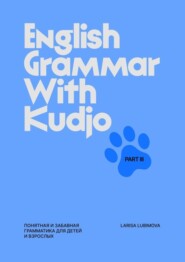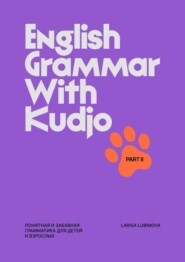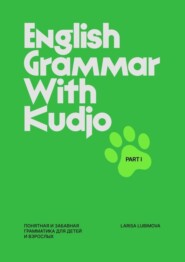По всем вопросам обращайтесь на: info@litportal.ru
(©) 2003-2025.
✖
English Grammar with Kudjo. Part 4. Понятная и забавная грамматика для детей и взрослых
Настройки чтения
Размер шрифта
Высота строк
Поля
b very certain
c quite certain
9 After such words Kudjo became ***** to find that lab.
a far more determinedly
b far more determined
c by far more determined
10 He thought ***** about himself at that moment.
a most little
b leastest
c least
EXERCISE 12
Translate the story:
Теперь уже Куджо торопил рысь. Ему очень хотелось как можно быстрее попасть в эту самую лабораторию и убедиться, что ни одни из его друзей не попал туда. Куджо шел за рысью и думал откуда появляются безумцы, готовые ставить самые ужасные опыты на животных и почему их никто не останавливает. Он размышлял о том, как сразу после того, как он уничтожит лабораторию и выпустит животных на свободу, он еще раз попытается найти приведение пра-пра-пра-пра-пра-пра бабушки Луны, чтобы отдать ей недостающий кусочек пазла. Он был почти уверен, что это положит конец семейному проклятию и все опять будут жить беззаботно и весело. Стоп! А где же кусочек пазла? Куджо был абсолютно уверен, что он был все время с ним. Он выглядел настолько потрясенным и расстроенным, что рысь тоже разволновалась. Она постаралась успокоить Куджо, уверяя его, что он скорее всего оставил этот кусочек в пещере или в яме и они непременно его найдут, сразу же после разгрома лаборатории. Рысь звучала убедительно и Куджо немного успокоился. Тем более, что они уже подошли к горе, под которой скрывалась лаборатория. Гора выглядела не очень естественно, казалось даже, что она сделана из какого-то сплава камня с металлом. Они вползли через какой-то ход, который привел их в небольшую комнату с огромной клеткой….
(продолжение следует)
Unit 7
Nouns
COUNTABLE – UNCOUNTABLE NOUNS
Countable nouns are things that can be counted. Most nouns in English are countable: three dogs, two ghosts, etc.
These nouns can have plural forms and be used with a, an, some, any, every, each, all, several, many, plenty of, a (large, great, good) number of, a couple of, a lot of, lots of, few, a few, fewer, the fewest, both, either, neither, none of.
Uncountable (or mass) nouns are things we typically view as a single entity. We cannot count them or divide them into separate elements: air, information, etc.
They cannot be plural.
There are some exceptions. Sometimes you can hear: I’ve had two coffees. It is just a short way of saying two cups of coffee.
Another exception is to make the uncountable noun plural while talking about several different types of an uncountable noun:
Luna loves all the meats. (meats = types of meat)
Other nouns that can be used this way include cheese, oil, metal, wine, food, bread, and fruit.
You can’t use a/an with uncountable nouns but you can use some, any, plenty of, this, that, all, much, a great/good deal of, an amount of, a lot of, lots of, little, a little, less, the least, none of.
The most common uncountable nouns are:
Mass nouns: fluids: blood, milk, water, etc., solids: bread, ice, iron, etc., gases: air, smoke, steam, etc., particles: dust, hair, salt, etc..
Subjects of study: History, Literature, Psychology, etc.
Languages: English, German, Spanish, etc.
Games: chess, football, tennis, etc.
Diseases: flu, measles, mumps, etc.
Natural phenomena: fog, sunshine, thunder, etc.
Some abstract nouns: accommodation, advice, housework, etc.
Collective nouns: baggage, furniture, money, etc.
EXERCISE 1
Write (C) if the noun is countable or (U) if it is uncountable:
1 mineral water
2 toast
3 silver
4 Geography
5 weather
6 coin
7 advice
8 backpack
9 knowledge
10 traffic
11 tunnel
QUANTIFYING UNCOUNTABLE NOUNS
Many uncountable nouns can be made countable by adding a partitive: a slice of bread, a strand of hair, a drop of water, a bar of soap, an ear of corn, a blade of grass, a ray of light, a coat of paint, a glass/bottle of water/lemonade/iced tea, a jar of jam, a can of Coke, a tin of salmon, a sheet of paper, a box of chocolates, a packet of cookies, a slice/loaf of bread, a pot of yoghurt, a pot/cup of tea, a kilo/pound of meat, a rasher of bacon, a tube of toothpaste, a bit/piece of chalk, a bag of rice, a pair of trousers, a game of football, a (n) item /piece of news, a carton of milk, a block of wood, a flash/bolt of lightning, a clap/peal of thunder, etc. With most nouns like information, advice, equipment, and furniture, we can use the word piece: Kudjo is wise enough to give a lot of pieces of advice.








